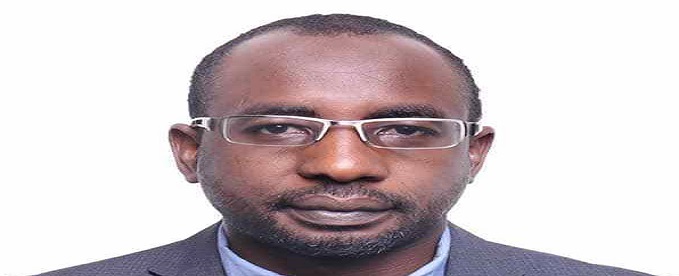Telecom
NITDA Calls for Synergy Among Stakeholders in Curtailing Financial Fraud and Cybecrime

National Information Technology Development Agency (NITDA), has condemned the labeling of many hardworking Nigerians in the Information Communication Technology (ICT) sector as criminals.
The agency was responding to the recent allegations of Financial Fraud and Cybercrimes leveled against some Nigerians, by the United States government.
NITDA, said that the action of a few individuals does not represent thousands of hardworking professional Nigerians with exemplary careers in Information Technology
Kashifu Abdallah Inuwa, director general/ CEO, NITDA stated that the action of a few individuals cannot be said to represent the action of thousands of hardworking Nigerian professionals with exemplary careers in Information Technology.
In a statement, Inuwa said that “The attention of the National Information Technology Agency (NITDA) has been drawn to reports in international media indicting scores of Nigerians for Cybercrimes in the United States.
“We also note a recent publication of a foreign-owned software company hitherto operating in Nigeria indicting its Nigerian employees for lack of integrity and duplicity.
“For the avoidance of doubt, NITDA is resolute that the action of a few individuals does not represent thousands of hardworking professional Nigerians with exemplary careers in Information Technology.
“Nigerian technology entrepreneurs, start-ups, scale-ups, and midsized companies have continued to blaze the trail in innovation and service provisioning in Africa and the world.
“We also celebrate thousands of Nigerian professionals who currently work and contribute to the development of innovation and Information Technology in leading multinationals operating globally.
“NITDA is concerned that knee jerk reactions following these allegations may lead to poor treatment of Nigerians living outside Nigeria or denial of certain financial services that may hamper economic growth or frustrate investments into Nigerian companies especially start-ups who need investments to sustain innovation. “It is grossly unfair to taint an entire nation with a single brush for the alleged crimes of a few.
“We, therefore, encourage other nations who are friends of Nigeria to caution their local authorities from treating innocent Nigerians travelling or living in other countries in a derogatory manner or denying Nigerians services without proof of any crime.
“NITDA also acknowledges the hard work and commitment of several law enforcement agencies including the Office of the National Security Adviser (ONSA), the Economic and Financial Crimes Commission (EFCC), Nigerian Financial Intelligence Unit (NFIU) and the Independent Corrupt Practices and other related Offences Commission (ICPC) for their dedication to investigations and prosecuting cybercriminals.
“NITDA therefore calls on all stakeholders such as financial and security regulators, banks, payment infrastructure and aggregator companies etc. to proactively work together with the Agency to entrench positive cybersecurity practices and propose policy solutions to buck this trend.
“The Agency, in exercise of its mandate as contained in Section 6(l) of the NITDA Act 2007, which mandates the Agency to propose policies and legislation to improve cybersecurity, will in the coming weeks summon a critical stakeholder session of all stakeholders to assess our collective performance in preventing cybercrimes with a view at proposing ideas and policies to combat this scorching menace of cybercrimes.
“We urge all stakeholders to prepare proposals and ideas to improve preventive measures to curtail cybercrimes.”
Telecom
MTN Nigeria Wins Award for Best Use of Data @MarkHack 4.0 Awards Night

MTN Nigeria’s commitment to digital innovation took center stage at MarkHack 4.0, the annual marketing and technology conference held at Landmark Event Centre, Victoria Island, Lagos, on Friday, May 23, 2025, with the theme ‘Experience Ignited: Fueling the Customer’s Journey’.

L-R: Akinbulejo Onabolu, Head, Enterprise Segment, MTN Nigeria; Eneyi Obi, Global Chief Marketing Officer, Rise; Tobi Olanisimi, Marketing Manager, AB InBev; Martha Kayode, Marketing Head, PZ Cussonz; Sulaiman Shaibu, CEO, BFT Consulting Service and Daniel Adeyemi, Managing Editor, Condia Business at the MarkHack 4.0 Conference held at the Landmark Event Centre, Victoria Island, Lagos on Friday, May 23, 2025.
In a celebration of innovation, technology, and storytelling, the company also took home the award for Best Use of Data in a Marketing Campaign at the Nigeria MarTech (MarkHack 4.0) Awards Night. This award recognizes brands that have successfully transformed data into compelling narratives and actionable insights to meaningfully engage their audiences.
Akinbulejo Onabolu, Senior Manager, Segment Management, Enterprise Business at MTN, joined a panel to discuss the power of immersive technologies on consumer behaviour. Drawing from MTN’s launch of its 5G Digital Experience Centre in Abuja last year, Onabolu highlighted the rapid evolution of immersive technologies such as Virtual Reality (VR) and Augmented Reality (AR) stating “Our 5G centre is a sandbox for our customers to come and see how technology can shape things. At the launch event, we unveiled a smart city to customers, clients and dignitaries in attendance, with gaming and other tech experiences.”
On the intersection of data, AR and VR, he added: “Co-creating with MTN takes our minds to a platform where different partners, companies and creators can bring their buildings, products and businesses for people to see via augmented reality and connectivity, just swiping through and following through that journey.
“As a part of impacting our customer’s lives, a few years ago, we also played around with the Metaverse and we ended up creating some of our back-office processes with some of our customer journeys on augmented reality and virtual reality such that a customer somewhere can engage with a virtual agent to solve real life problems and integrating that back into our operating systems. As an organization, at a lot of our events, you will find a lot of AR and VR experiences.”
Speaking on how MTN is embedding immersive technology into its day-to-day operations, he explained that the company is prioritizing both internal capability development and external engagement. “85% of our organization has undergone extensive training on AI and that already is a great addition to our daily lives. We’re using it to do things differently, developing user journeys and brainstorming different things. In terms of Augmented Reality and Virtual Reality, we are working with organizations to develop training programs which we use internally.”
He described the bases for this tech as stable connectivity, high bandwidth, high speed and low latency. “Over the past year, we’ve doubled our 5G capacity across the entire country. Wherever you are, you’ll probably start to pick up 5G. With our FibreX service, we’re going way beyond connectivity to create the systems and platforms to support the ecosystem, AR and VR. In addition to this, we’re also engaging regulatory systems to start to tease this out and build the proper governance.”
The session, moderated by Daniel Adeyemi, Managing Editor at Condia Business, also featured insights from leaders in FMCG, consulting, and global marketing, all underscoring the transformative potential of immersive technologies for Africa’s future.
Telecom
MTN Nigeria Invests ₦900Bn in 2025 to Boost Network Quality in Lagos & Abuja

MTN Nigeria has announced a massive capital expenditure (CAPEX) drive for 2025, nearly doubling its investment to almost 900 billion Naira, as it seeks to significantly enhance network service quality in major cities like Lagos and Abuja and extend improvements to other areas.

Karl Toriola
This financial commitment, up from a combined total of approximately 440 billion Naira spent in 2023 and 2024, was detailed by MTN Nigeria CEO, Dr. Karl Toriola, during a recent interview on Arise TV.
Toriola highlighted that a key focus of the increased CAPEX will be on “putting additional capacity in a city like Lagos, particularly in Abuja, where you have a lot of buildings coming up, you need additional sites because there are coverage issues.”
Beyond these critical urban centres, the investment aims to bolster network resilience and ensure power stability for its infrastructure nationwide. This includes proactively addressing site outages by ensuring timely payment for operational necessities such as diesel for generators, a persistent challenge in the Nigerian operating environment
The CEO outlined the comprehensive nature of the upgrade process, which involves “placing orders formally, opening letters of credit, and then the equipment gets shipped in and installed.” He added that where necessary, MTN will be “acquiring new sites” and “laying fiber to the base station to create better stability.”
While the immediate CAPEX is geared towards improving existing service quality and capacity, this investment aligns with MTN’s broader goals, which include enhancing financial inclusion in underserved rural areas, suggesting a long-term vision for network expansion and service improvement that extends beyond metropolitan areas.
Customers are expected to begin experiencing the positive impact of these investments with a “significant improvement in quality of service” anticipated by the end of the second quarter or early in the third quarter of 2025, according to Toriola.
Telecom
Airtel’s AI Spam Alert Flags 9.6m Spam Attempts

Airtel Nigeria, telecom service provider, has announced that its AI-powered Spam Alert Service issued over 9.6 million spam alerts between March 13 and May 20, 2025.

As part of its ongoing commitment to protecting customers from unwanted and potentially fraudulent communications, Airtel designed the AI Spam Alert service to analyze traffic patterns and detect anomalies.
In the period since launch the AI pinpointed a total of 9,667,008 SMS as potential spam messages in the two months after its launch.
Of these, the system identified 528,080 on-net (Airtel-to-Airtel) and 9,138,928 off-net (from other networks) numbers as suspected spam messages, demonstrating the scale of the threat and Airtel’s advanced processing capability.
Airtel Nigeria is a subsidiary of Airtel Africa.
Commenting on this development, Dinesh Balsingh, CEO, Airtel Nigeria, restated Airtel`s commitment to protecting its customers.
“This milestone demonstrates the strength of our AI-driven infrastructure in combating the growing menace of spam and scam calls. At Airtel Nigeria, we are focused on connecting Nigerians and ensuring their safety and confidence while using our network.
“We understand that trust is the cornerstone of digital communication. That’s why we’ve invested heavily in intelligent systems that not only detect potential threats but also learn and evolve with data. As threats become more sophisticated, so will our solutions. As a company, we remain focused on leading the industry in innovation and customer satisfaction, ensuring that every Nigerian can enjoy a safer and smarter digital experience,” Mr. Balsingh said.
The Spam Alert Service is part of Airtel Nigeria’s broader strategy to integrate artificial intelligence into its core offerings to deliver smarter and safer experiences for its customers across the country.
Recall that the Spam Alert Service was launched on March 13, 2025. A groundbreaking and free solution from Airtel, it notifies users in real-time of suspected spam SMS messages by analyzing over 250 parameters.
The Airtel AI Spam Alert Service is available to all Airtel subscribers on smartphones and feature phones.

 E-Financial3 days ago
E-Financial3 days agoEFCC Recovers over N20Bn Stolen by Hackers from 6 Banks in Nigeria

 Telecom3 days ago
Telecom3 days agoEngr. Ikechukwu Nnamani Receives Two Prestigious @ABoICT Awards

 Telecom3 days ago
Telecom3 days agoFG to Deploy 80 Percent of 7000 Telecom Towers to North

 E-Business2 days ago
E-Business2 days agoNigeria Among Hotspots as Kaspersky Warns of Rising Ransomware Threat in Africa

 E-Financial2 days ago
E-Financial2 days agoFidelity Bank Plc Wins 2025 DBN Innovation Award for MSME Support

 E-Financial3 days ago
E-Financial3 days agoPonzi Scheme Operators Risk N10m Penalty, Others- IST Chair

 News3 days ago
News3 days agoEFCC Recovers Funds, Arrests Suspects in N1.3 Trillion CBEX Crypto Fraud

 E-Financial3 days ago
E-Financial3 days agoUBA Launches *919# Advance Top-Up Feature for Instant Access to Customers




























